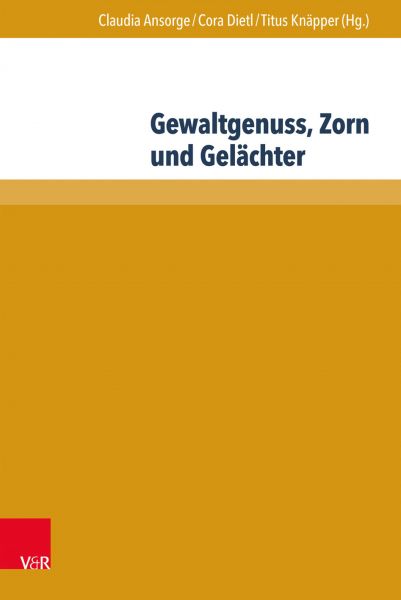Gewaltgenuss, Zorn und Gelächter
Die emotionale Seite der Gewalt in Literatur und Historiographie des Mittelalters und der Frühen Neuzeit
Violence and the escalation of violence are often linked with emotion and passion. Emotions function to prepare, stir and perform violence, which again stimulates emotions and might lead to a loss of control and (in the case of collective violence) to an intensified coherence of the violent community. Literary or historiographic texts that depic collective violence, functionalise the factor "emotions" in different ways, depending on the respective context: They might serve at justifying violence, or making it plausible, at condemning it, or making it more comprehensible or even enjoyable. This is true both for modern and older accounts. The essays that are collected in the present volume are presented by members of the Giessen research group Communities of Violence and their guests. They ask whether there are perspectives of the emotional side of violence which are specific for certain epoques, and anyalyse medieval and early modern depictions of emotional acts of violance, with a special focus on their contexts, their messages and their aesthetic of reception.
Claudia Ansorge ist Wissenschaftliche Mitarbeiterin in der Gießener DFG-Forschergruppe »Gewaltgemeinschaften«.
Gewalt wird durch Emotionen vorbereitet und erweckt ihrerseits Emotionen, die bei kollektiv verübter Gewalt das Gemeinschaftsgefühl verstärken können. In literarischen und historiographischen Darstellungen von kollektiver Gewalt wird der Faktor Emotion je nach Kontext eingesetzt, um Gewalt zu rechtfertigen, zu verurteilen oder aber nachvollzieh- und genießbar zu machen. Gibt es epochentypische Zugänge zur emotionalen Seite der Gewalt? Dem gehen die Beiträge nach. Sie befragen mittelalterliche und frühneuzeitliche Darstellungen emotional gelenkter Gewalt nach ihrem Kontext, ihrer Aussage und Rezeptionsästhetik.
Versandkostenfreie Lieferung! (eBook-Download)
Als Sofort-Download verfügbar
- Artikel-Nr.: SW9783847002574110164
- Artikelnummer SW9783847002574110164
-
Mit
Claudia Ansorge, Cora Dietl, Titus Knäpper, Marina Klamt, Titus Knäpper, Werner Röcke, Christoph Schanze, Dagmar Schmidt, Silvan Wagner
- Verlag V&R Unipress
- Seitenzahl 181
- Veröffentlichung 17.06.2015
- ISBN 9783847002574
- Verlag V&R Unipress

